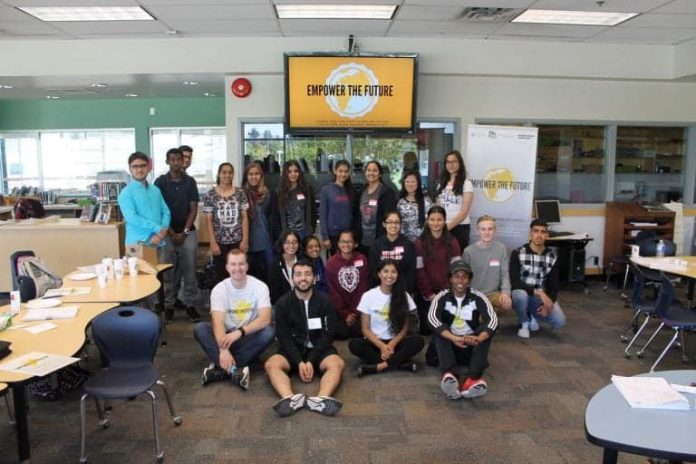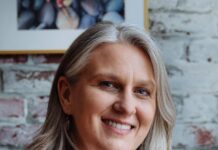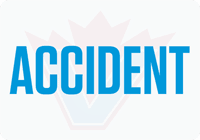
Photos: UBC
WHEN Shawna Narayan looked back on her first-year, she realized that things would have been easier if she’d received a little advice from a local peer before even stepping foot on UBC’s campus.
Determined to help the next generation of Surrey students get the information they need to be successful in the transition to post-secondary, Narayan took action. She reached out to her high school principal at Frank Hurt Secondary School and offered to mentor students.
“Coming from an inner-city school in Surrey, I didn’t feel like I had the same supports or university preparation as some of my peers at UBC,” said the fourth-year student, who is completing a bachelor of science in physics. “For example, I only heard about scholarships after the deadline passed.”
 The mentorship quickly grew and now Narayan runs a successful peer mentorship and university preparation project called Life After High School through her organization Empower the Future. The project consists of workshops that cover topics like financial planning (with detailed information about student loans, scholarships and bursaries), time and stress management and the benefits of volunteering. Participants also receive a resource package to take home that includes information about Lower Mainland university and college programs. The workshops supplement the information and advice high school students receive during university recruitment visits and through their school’s counselling services.
The mentorship quickly grew and now Narayan runs a successful peer mentorship and university preparation project called Life After High School through her organization Empower the Future. The project consists of workshops that cover topics like financial planning (with detailed information about student loans, scholarships and bursaries), time and stress management and the benefits of volunteering. Participants also receive a resource package to take home that includes information about Lower Mainland university and college programs. The workshops supplement the information and advice high school students receive during university recruitment visits and through their school’s counselling services.
“The workshop includes a question and answer period and it’s very important for the attendees,” she said. “It can be intimidating to ask a university recruiter or advisor questions but it is a lot more comfortable to ask a graduate from your high school, especially because they’ve been through it all recently.”
The mentoring workshops started as a single session but now, three years later, 300 youth have attended Empower the Future’s programs. A team of ten volunteers now hold events in six Surrey schools, where 27 of the city’s 125 schools are designated inner city.
 “When I attended the Life After High School workshop in Grade 10, I wasn’t quite sure what my future beyond high school would look like,” said Rebecca Lim, a student from Frank Hurt Secondary School who was recently awarded a $100,000 Schulich Leaders Scholarship to study engineering at UBC. “Throughout the session, I was introduced to plenty of resources that were really helpful in planning my post-secondary path. I also received some valuable advice from UBC students who knew exactly what it felt like to be in my position. Something that stuck with me was the importance of finding a balance between striving for success in your studies and getting the university experience. I hope to find that balance when I arrive on campus in the fall.”
“When I attended the Life After High School workshop in Grade 10, I wasn’t quite sure what my future beyond high school would look like,” said Rebecca Lim, a student from Frank Hurt Secondary School who was recently awarded a $100,000 Schulich Leaders Scholarship to study engineering at UBC. “Throughout the session, I was introduced to plenty of resources that were really helpful in planning my post-secondary path. I also received some valuable advice from UBC students who knew exactly what it felt like to be in my position. Something that stuck with me was the importance of finding a balance between striving for success in your studies and getting the university experience. I hope to find that balance when I arrive on campus in the fall.”
The success of the program has fueled demand from additional high schools in the Lower Mainland, and the program is expanding to Burnaby and Vancouver. To get this off the ground, Narayan applied for and was awarded a $10,000 Innovation grant from UBC’s Centre for Community Engaged Learning, an award to help students implement meaningful social change in their local communities.
 “Shawna’s project has the potential to result in a sizable and immediate impact for the students and schools she is serving,” said Susan Grossman, director of the Centre for Community Engaged Learning. “The pilot project completed last year already reached 200 students in six of Surrey’s inner-city schools with 73 per cent of students reporting an increased preparedness for post-secondary education and 82 per cent of students reporting an increased understanding of the financial aid available to them. I expect this larger project will reach even more students and result in very positive outcomes.”
“Shawna’s project has the potential to result in a sizable and immediate impact for the students and schools she is serving,” said Susan Grossman, director of the Centre for Community Engaged Learning. “The pilot project completed last year already reached 200 students in six of Surrey’s inner-city schools with 73 per cent of students reporting an increased preparedness for post-secondary education and 82 per cent of students reporting an increased understanding of the financial aid available to them. I expect this larger project will reach even more students and result in very positive outcomes.”
This May, Narayan also added a new workshop for students, focused entirely on mental health at university. She noticed that workshop participants were concerned about the issue and asked questions or had comments like: “How stressful is university?” “Will I still have time to hang out with friends?” and “I’m really anxious about post-secondary education.”
The event included talks from psychologists, health-care providers, and university students who shared their own experience with mental illness. It was held at the Burnaby Public Library so anyone could come and they were encouraged to bring their families.
“We know how important a role a parent can play in mental wellness and it’s important for parents to understand the stresses that their student is going through,” she said.
Empower the Future is also growing in other ways. For the first time this spring, they are offering three $250 scholarships and exploring an opportunity to offer the program to inner-city youth in Toronto.
Narayan has one more semester of school before she graduates and then she hopes to pursue graduate school in public health. While she’s not done with Empower the Future yet, she hopes others will take the lead on mentoring high school students.
“As I get older, I know my insight is not as important as someone who has just gone through it,” she said. “With each generation, there are different challenges.”
UBC continues peer-facilitated orientation for first year students through Jump Start, a multi-day orientation program at the end of August, open to all new students entering from high school. Students benefit from a transition program that introduces new students to university life and the learning environment, while making friends and meeting faculty members.













